TREATMENTS
Babies and children
If your baby is experiencing issues like torticollis, reflux, or developmental delays, early intervention through specialized pediatric physiotherapy can make a significant difference.
At My French Physio, expert therapists provide personalized treatments tailored to your child’s needs, ensuring gentle and effective care.
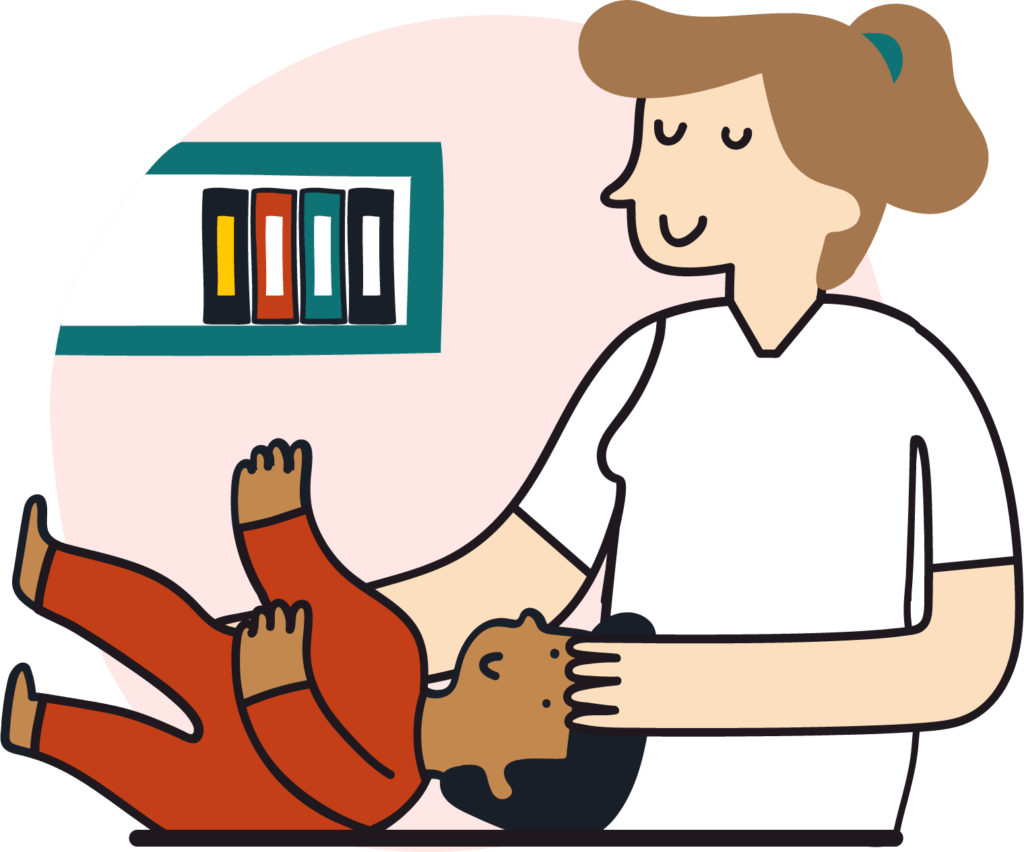
Description
There are 2 types of torticollis in children:
Congenital Postural torticollis :
Postural torticollis: This is the most frequently encountered and which regresses quite quickly if we adopt the right gestures and good postures at home early. It is a vicious attitude of the neck and the head. It is present from birth and is generally part of a postural syndrome due to the fetal position in the uterus. It is called comma syndrome or banana position. It is in fact initially, a simple preferential position which can increase and settle. It is a benign torticollis, often accompanied by plagiocephaly (or flat head), without muscle retraction. However, if this torticollis is neglected, the orthopedic, functional and psychomotor consequences can hinder the harmonious development of the baby. Muscular torticollis: As its name suggests, there is a muscular retraction causing the neck in an abnormal and permanent attitude in relation to the shoulders. The head is tilted and rotated opposite (we speak of right torticollis if the tilt is to the right). Sometimes it is even possible to feel the muscle retraction which is shaped like an olive. Associated with this rotation / tilt, there is an asymmetry of the face and plagiocephaly (flat head).
Congenital Muscle torticollis :
Postural torticollis: This is the most frequently encountered and which regresses quite quickly if we adopt the right gestures and good postures at home early. It is a vicious attitude of the neck and the head. It is present from birth and is generally part of a postural syndrome due to the fetal position in the uterus. It is called comma syndrome or banana position. It is in fact initially, a simple preferential position which can increase and settle. It is a benign torticollis, often accompanied by plagiocephaly (or flat head), without muscle retraction. However, if this torticollis is neglected, the orthopedic, functional and psychomotor consequences can hinder the harmonious development of the baby. Muscular torticollis: As its name suggests, there is a muscular retraction causing the neck in an abnormal and permanent attitude in relation to the shoulders. The head is tilted and rotated opposite (we speak of right torticollis if the tilt is to the right). Sometimes it is even possible to feel the muscle retraction which is shaped like an olive. Associated with this rotation / tilt, there is an asymmetry of the face and plagiocephaly (flat head).
What are the causes ?
Bronchiolitis is the most common respiratory disorder in babies caused by a viral infection of the lower respiratory system. There is a seasonal peak between late October and early March, but it can sometimes appear at other times of the year.
Its main cause is RSV (respiratory syncytial virus). 90% of babies under 2 years old are colonized by this virus and 40% of them will develop the disease, which makes this childhood condition the most common between 0 and 2 years old.
Additionally, bronchiolitis can have other causes such as allergies or environmental factors. For some children, bronchiolitis is the first manifestation of asthma.
This is why the role of the physiotherapist will be to determine what is the cause of bronchiolitis and then to develop an appropriate treatment.
How do I know if my baby has bronchiolitis?
Your doctor or physiotherapist will make the diagnosis if there is:
- A hiss on the exhale
- Runny nose
- Signs of respiratory distress
How does bronchiolitis progress?
Bronchiolitis usually begins in the upper airways (nose and back throat) and then progresses to the lower part of the respiratory system (bronchi and lungs).
The first symptom is a dry cough caused by inflammation, Inflammation is our body’s natural protection against external attacks. The inflammatory reaction can lead to edema (swelling of the airways) or even bronchospasm (this is the contraction of the small muscles located inside the respiratory system).
The combination of the 2 reduces the diameter of the airways, making it difficult for your child to breathe.
Secondly, a fatty cough appears due to the increased production of mucus. Our lungs continuously produce mucus to evacuate foreign cells (bacteria, viruses) and other impurities entering the lungs. The mucus is collected in our mouth and then swallowed and digested and passed in the stool. Adult or child, we do it all day long without even notifying it.
However, when there is inflammation or infection, the cleansing mechanism is overloaded and mucus builds up in the lungs. This is problematic for 2 reasons.
First, it reduces the diameter of the airways making it harder for the baby to breathe. Second, it increases the risk of developing another infection since bacteria or viruses will get stuck in the lungs.
Left untreated, the combination of inflammation, edema, and mucus make it harder to breathe forcing your baby to breathe faster and use the accessory respiratory muscles. This type of breathing is exhausting for the baby who is often already tired of being sick, not being able to sleep and without energy from eating less.
If this situation persists, your baby will be too tired and unable to maintain his rapid breathing reducing the oxygen entering his body. Medically, we speak of respiratory distress, characterized by:
- A high respiratory rate (over 50)
- An increase in the beating heart
- Dilated nostrils : the nostrils open quickly (we can perceive the same thing when we try to recover oxygen, by running for example)
- Augmentation of the hole under the Adam’s apple: As we use the accessory neck muscles to breathe, this increases the hole under the apple
- Increased depression under the ribs: similarly, the use of accessory muscles around the rib cage creates a depression below it.
- Perspiration: but without a feeling of heat to the touch
- Color change : The mouth and fingertips turn blue, the rest of the skin turns pale or gray
- Apneas of 10 seconds or more: the baby does not have enough energy and takes long pauses without breathing
These symptoms often appear in that order. However, they can also be caused by other medical conditions besides bronchiolitis. In any case, if one or more of these symptoms are present, do not hesitate to go to the nearest emergency room or to call an ambulance.
How to treat bronchiolitis?
Drug treatment: Your doctor or pediatrician may prescribe bronchodilators (to open the baby’s airways) or corticosteroids to decrease inflammation. Another effective way to reduce inflammation is by using a nebulizer with hypertonic saline.
Respiratory physiotherapy is a manual treatment including a nose wash and techniques to lift the mucus and avoid respiratory distress and limit the risk of infection.
DDH (Developmental Hip Dysplasia) is the fact that the head of the thigh bone is improperly inserted into the hip joint.
Babies who present by breech or have a family history of DDH have an increased risk of developing this disorder.
Signs include the baby’s inability to move the thigh outward at the hip and, later, difficulty walking and pain.
The Pavlik harness is used to correct DDH.
About one in 20 babies with DDH needs surgery to correct the defect.
More information ? Click on the link below:
www.aboutkidshealth.ca
Scoliosis is a permanent deviation of the spine, linked to a rotation of the vertebrae. It occurs mainly in childhood and adolescence, but can also appear in adulthood. This condition is sometimes the consequence of another disease or a malformation. However, its causes often remain unknown.
Scoliosis is a permanent deformation of the spine (or rachis) in the three planes of space, that is to say:
- up or down
- to the right or left
- forward or back
This deviation of the spine is linked to a rotation of the vertebrae with respect to each other. In scoliosis, the spine is twisted. Its natural curves, forwards and backwards, are modified.
This disease causes a gibbosity (deformity of the upper back in the shape of a bump).
Potty training is an essential part of your child’s growth.
The school, for example, will only accept this one if it is clean and no longer wears diapers.
Potty training should normally be acquired by the age of 2, but learning to walk is as, if not more, a complex process.
And since there are many taboos surrounding it, it is as much a motor and neurological process as it is a psychological one.
– Nocturnal enuresis is a condition characterized by the occurrence during sleep of involuntary and unconscious urination in children over five years of age or adults. This is what is colloquially referred to as “wetting the bed”. Bedwetting is due to too deep sleep, a lack of maturity of the urination reflex or a psycho-affective disorder. In rare cases, bedwetting is a sign of a malformation of the urinary tract.
Nocturnal enuresis is said to be primary if the child has always wet his bed and secondary if a period of cleaning of 6 months has been observed. In this case, the cause is often a psychoaffective disorder.
It is said to be mono-symptomatic if it is isolated, that is to say if it is not associated with enuresis or daytime voiding problems. ”
– Encopresis is a form of fecal incontinence. It can be present in a child over four years old or in adults. The main manifestation is the involuntary loss of fecal matter. The causes and origins can be physiological or psychological.
Treatments
Treatments
Treatments
Do not confuse reflux and vomiting ( reflux-gastro-oesophageal-rgo in children ), the second being due to a violent contraction of the baby’s abdominal muscles, passively bringing up the contents of the stomach through the esophagus and then the mouth.
While some reflux symptoms are fairly obvious (your baby spitting out everything they swallow, for example), others will be quieter:
- Frequent waking up at night
- Weight loss or gain
- Heavy crying or irritability after a feed
- General discomfort or pain when lying down
- Persistent cough
The main cause of these problems is the immaturity of the baby’s digestive system. This is why the symptoms decrease or even resolve around 6 months.
The second cause is food. Whether it is breast milk or formula milk can constipate the baby, give gas and reflux. For industrial milk, it is sometimes necessary to change milk in order to see the impact of this on the digestion of the child.
If you are breastfeeding, your diet will need to be changed. Stopping irritating foods like spices, vinegars, coffee, chocolate, dairy products and stimulants like nicotine can reduce or even solve the problem.
Here are some other tips to follow:
- Don’t hesitate to burp your baby regularly
- Avoid feeding him too much and too quickly (take breaks in the suckling)
- Keep your baby upright after eating
Osteopathy does not resolve the root cause (digestive immaturity or diet) but the treatment is very effective in reducing symptoms by reducing abdominal and diaphragmatic tension.
At the very least, this allows your child to have symptom-free periods by giving the digestive system time to mature or change their diet.
Treatments
Discover our specialized physiotherapy and perineology care, supporting women through pregnancy, post-partum, menopause, and beyond. We offer tailored treatments for pregnancy pain, prolapse, and more, using advanced techniques like lymphatic drainage.
To better serve you, we welcome you at three convenient locations. Choose the one that suits you best and book your appointment today for personalized care!
Why choose My French Physio?
Experienced and Specialized Team
Our team consists of highly trained physiotherapists and osteopaths with decades of experience. Each therapist is an expert in his/her field: Women's Health, Baby Physio, MSK (musculoskeletal), and Sports Physio, ensuring the best care tailored to your needs.
Advanced Qualifications and Continuous Learning
All our therapists hold advanced degrees, including master's level education, and regularly engage in Continued Professional Development (CPD) to stay at the forefront of their specialties.
Hands-On, Personalized French Approach
We pride ourselves on our distinct French approach to therapy, which emphasizes hands-on techniques combined with personalized exercise plans, providing comprehensive and effective treatment.
Team
Meet Our Team
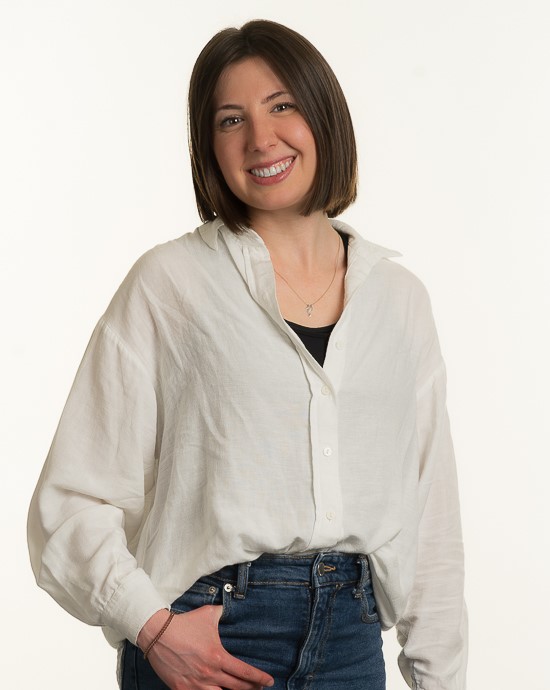
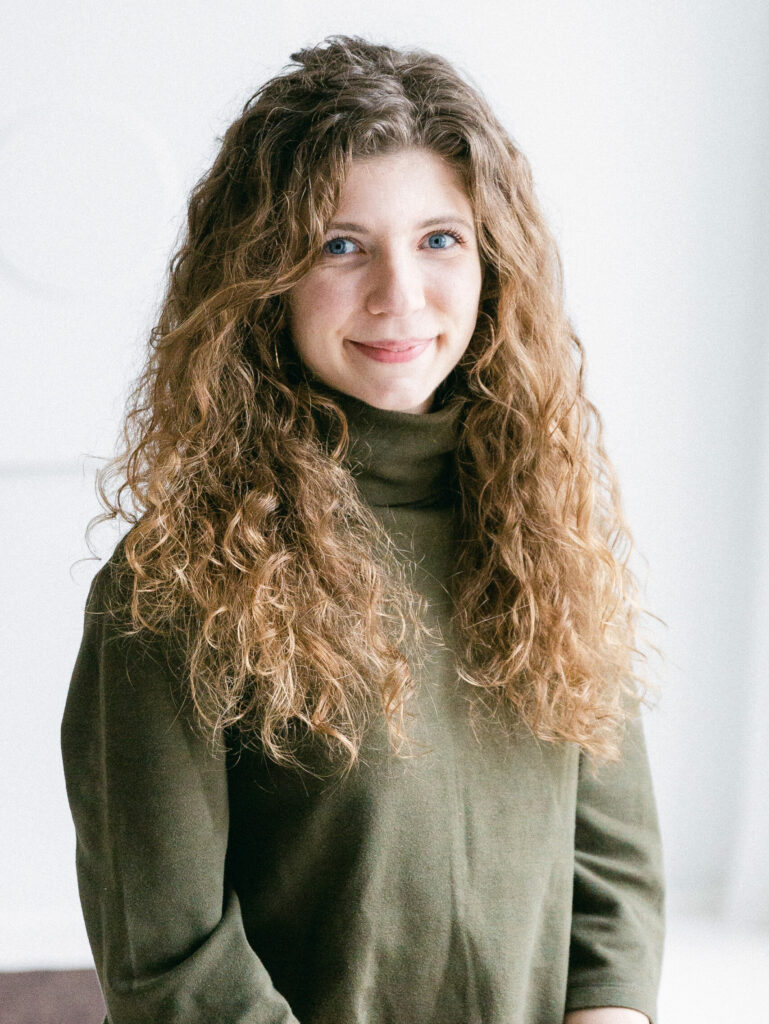
Karolina graduated as a physiotherapist from Hungary’s leading medical institution, Semmelweis University, in 2022 in Budapest. She completed her MSc at UCL in children’s health in 2023.
During her Bachelor’s degree, she received a scholarship for carrying out research in the field of paediatrics. She focused on the rehabilitation of the first baby who received gene therapy in Hungary for Spinal Muscular Atrophy, a rare genetic disease affecting the musculoskeletal system. During her studies, she spent a considerable amount of time on Covid-19 hospital wards taking care of patients as a volunteer and learning about how respiratory diseases could affect the musculoskeletal and neurological systems.
Besides completing her core rotations in each area within physiotherapy during her Bachelor’s degree, she gained further experience in the treatment of different muscoloskeletal problems, such as back pain, sprain injuries or tendonitis. Specifically, being a dancer herself, she is interested in working with dancers of all kinds and other performing artists.
After the pandemic, she continued her volunteering job on a paediatric rehabilitation ward in one of Budapest’s most prestigious children’s hospitals. There, she saw a wide variety of cases ranging from motor development delays, rare genetic diseases, and neurological dysfunctions to traumatic injuries, oncological cases, and psychological disorders.
After earning her physiotherapist degree, Karolina received a full scolarship to study MSc Infancy and Early Childhood Development at University College London, where she further specialised in the field of paediatrics. She learnt about young children, their development and how to best support their health at Great Ormond Street Institute of Child Health. Over the course of her studies, she became interested in mothers’ well-being as well. That is why she researched postpartum physical activity and its effect on mothers’ health as part of her degree. She gained knowledge on the specificities of birth and the postnatal period, with a special focus on rehabilitative exercise. During her MSc, she also learnt about the evidence-based physiotherapy of the pelvic floor.
Karolina is an Infant Massage Instructor, a dancer and an enthusiast of babies’ and their mothers’ health and well-being. She is an HCPC-registered physiotherapist, and a member of the CSP and APCP.
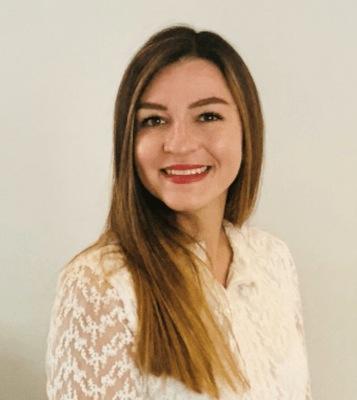
Specialized in Sports Physiology and Perineal Rehabilitation Mathilde graduated from the CHU Grenoble Alpes physiotherapy school.
During her apprenticeship, she developed interests in areas such as athlete monitoring and rehabilitation, perineal rehabilitation as well as pediatrics. Areas that she continued to explore within her practice in various firms in Grenoble, then in Paris.
Between 2015 and 2017, she gained experience in the sports world:
By following the women’s Rugby team in Grenoble (cadets then team 2) as a physiotherapist in the pre, during and post match.
On reputable trails and Iron man, as a student and then as a physiotherapist, during the Ultra Trail du Vercors (2 years), the Embrunman (3 years) or the Ultra Trail des 4 Massifs (UT4M).
In Grenoble offices specializing in post-surgical rehabilitation, rehabilitation of skiers and high mountain athletes.
Strongly committed to the rehabilitation of top-level athletes, Mathilde completed her research thesis on the theme of preventing musculoskeletal risks in young dancers in classical dance. His research led him to develop an information and prevention website for classical dance: “Dance your health!”.
It is in this perspective that she wished to prepare a master’s degree in Engineering for Health and Medicines (ISM) by participating in a scientific project conducted with the Opéra Garnier in Paris, “classical dance and cardio respiratory endurance. “.
At the end of 2017, she left the Alps for the capital with a view to developing the field of perineal rehabilitation. She is trained in the perineal file of B. de Gasquet (assessment approach, education, prevention and rehabilitation of the perineum integrating protection of the spine and maintenance of a harmonious abdominal tone) but also other fields such as respiratory physiotherapy in infants. which she practices in a cabinet in Versailles.
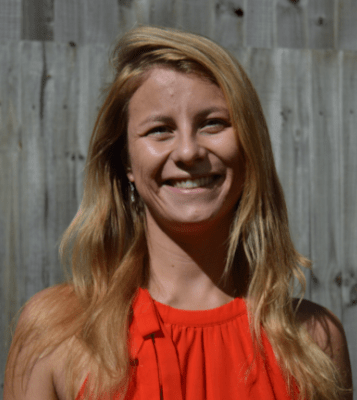
Elodie graduated from the masso-kinesitherapie training institute in Besançon (France) in June 2010.
The same year, she obtained her university diploma in ethics (medical work in multidisciplinarity and management of difficult cases).
Following her diploma, Elodie continues to train and specialize in women’s care.
In 2011, she obtained a diploma in perineal re-education (manual practice and with equipment for perineal re-education), then a diploma in abdominal gymnastics that did not generate pressure (Gasquet method).
At the same time, she also follows the ABDO-Mg training of Luc Guillarme to prevent hyper-pressures on the perineum and abdominal diastasis.
She then continued with a diploma in K-taping in the context of women in pre and post partum but also in the context of sportsmen.
Discovering the limits of traditional physiotherapy, Elodie trained in manual therapy specializing in women’s care from 2011 to 2013.
Then trained in lymphatic drainage thanks to the Schiltz method.
In 2012, Elodie also pursued a university degree in pelvi-perineology at the University of Lyon as well as a diploma in respiratory physiotherapy at SUK in Paris.
Since 2012, Elodie has continued to train (about twice a year) in order to follow the evolution of techniques and participates in numerous conferences.
In 2014, she became interested in perineal pain and participated in 2 trainings in London and Paris on their subject.
In 2015, Elodie refocused on pregnant women and their problems, preparing for childbirth and carrying in a sling.
Lately, Elodie has trained in sports and abdominal or perineal problems caused by sport.
Elodie is an active member of the international society for rehabilitation in pelvi-perinology.
She has also given numerous interviews in French and English magazines:
Elodie worked for 4 years in France in practices located in Besançon and Lyon, specializing in women’s care and pediatrics.
Then, for 3 years, Elodie worked in a London firm also specialized in these same fields.
Perineal rehabilitation and more generally everything related to pregnancy and women’s health are areas that Elodie is very passionate about. She invests a lot in these treatments and always pushes the deepening.
Elodie also has significant knowledge in pediatrics (neuromotor delay, orthopedics and traumatology) and privileged contact with children.
Elodie is a Physiotherapist, HCPC registered, covered by most insurances.
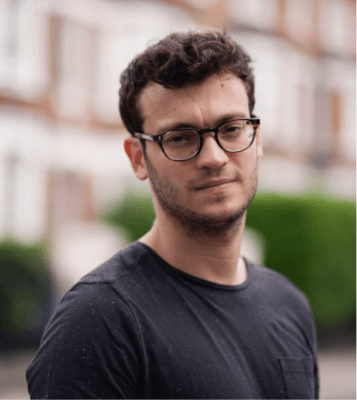
In 2010, Virgil graduated from the physiotherapy institute of Charleroi in Belgium.
The following year, he added a master’s degree in physiotherapy as such.
Tired of the Belgian climate, he decided, thereafter, to practice in Spain and in the south west of France, specializing in 3 areas: Sports physiotherapy, care of women and pediatrics. He works within different structures: With Marcel Cauffriez , specialist in hypopressive gymnastics (very famous in the postnatal field and in the care of women)
- Within Respiralia , a center for children with cystic fibrosis. He took the opportunity to train in respiratory physiotherapy with Guy Postiaux
- Within Polideportivo Principe De España, specializing in the treatment of top athletes from the Balearic Islands
- In a trauma and post-surgical rehabilitation center in Bordeaux
In 2012, Virgil moved to London, not only to practice his profession as a physiotherapist in a new culture and discover a different approach to his profession, but also to obtain a master’s degree in Osteopathy at the very famous British school of osteopathy will graduate in 2014.
At the same time, Virgil continues to train in new areas:
- In pediatric cranial osteopathy and other pediatric treatments at the BSO Children’s Clinic
- In women’s care, participating in training in visceral osteopathy and obstetric osteopathy
- In sports physiotherapy, obtaining an Inter University Diploma at the National Institute of Sport ( INSEP ). He puts this diploma directly into practice by following a South London Rugby team.
In parallel with his patients, Virgil still continues his research mainly focusing on the sitting posture and now teaches in Belgian training institutes.

Elodie graduated from the masso-kinesitherapie training institute in Besançon (France) in June 2010.
The same year, she obtained her university diploma in ethics (medical work in multidisciplinarity and management of difficult cases).
Following her diploma, Elodie continues to train and specialize in women’s care.
In 2011, she obtained a diploma in perineal re-education (manual practice and with equipment for perineal re-education), then a diploma in abdominal gymnastics that did not generate pressure (Gasquet method).
At the same time, she also follows the ABDO-Mg training of Luc Guillarme to prevent hyper-pressures on the perineum and abdominal diastasis.
She then continued with a diploma in K-taping in the context of women in pre and post partum but also in the context of sportsmen.
Discovering the limits of traditional physiotherapy, Elodie trained in manual therapy specializing in women’s care from 2011 to 2013.
Then trained in lymphatic drainage thanks to the Schiltz method.
In 2012, Elodie also pursued a university degree in pelvi-perineology at the University of Lyon as well as a diploma in respiratory physiotherapy at SUK in Paris.
Since 2012, Elodie has continued to train (about twice a year) in order to follow the evolution of techniques and participates in numerous conferences.
In 2014, she became interested in perineal pain and participated in 2 trainings in London and Paris on their subject.
In 2015, Elodie refocused on pregnant women and their problems, preparing for childbirth and carrying in a sling.
Lately, Elodie has trained in sports and abdominal or perineal problems caused by sport.
Elodie is an active member of the international society for rehabilitation in pelvi-perinology.
She has also given numerous interviews in French and English magazines:
Elodie worked for 4 years in France in practices located in Besançon and Lyon, specializing in women’s care and pediatrics.
Then, for 3 years, Elodie worked in a London firm also specialized in these same fields.
Perineal rehabilitation and more generally everything related to pregnancy and women’s health are areas that Elodie is very passionate about. She invests a lot in these treatments and always pushes the deepening.
Elodie also has significant knowledge in pediatrics (neuromotor delay, orthopedics and traumatology) and privileged contact with children.
Elodie is a Physiotherapist, HCPC registered, covered by most insurances.

In 2010, Virgil graduated from the physiotherapy institute of Charleroi in Belgium.
The following year, he added a master’s degree in physiotherapy as such.
Tired of the Belgian climate, he decided, thereafter, to practice in Spain and in the south west of France, specializing in 3 areas: Sports physiotherapy, care of women and pediatrics. He works within different structures: With Marcel Cauffriez , specialist in hypopressive gymnastics (very famous in the postnatal field and in the care of women)
- Within Respiralia , a center for children with cystic fibrosis. He took the opportunity to train in respiratory physiotherapy with Guy Postiaux
- Within Polideportivo Principe De España, specializing in the treatment of top athletes from the Balearic Islands
- In a trauma and post-surgical rehabilitation center in Bordeaux
In 2012, Virgil moved to London, not only to practice his profession as a physiotherapist in a new culture and discover a different approach to his profession, but also to obtain a master’s degree in Osteopathy at the very famous British school of osteopathy will graduate in 2014.
At the same time, Virgil continues to train in new areas:
- In pediatric cranial osteopathy and other pediatric treatments at the BSO Children’s Clinic
- In women’s care, participating in training in visceral osteopathy and obstetric osteopathy
- In sports physiotherapy, obtaining an Inter University Diploma at the National Institute of Sport ( INSEP ). He puts this diploma directly into practice by following a South London Rugby team.
In parallel with his patients, Virgil still continues his research mainly focusing on the sitting posture and now teaches in Belgian training institutes.
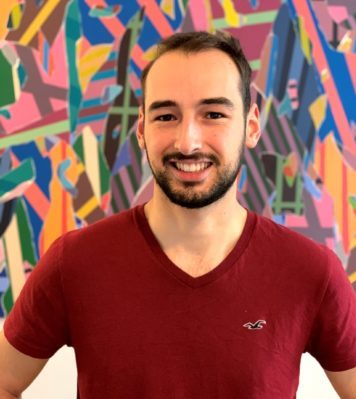
Fields :
- Musculoskeletal disorders
- Strain Counterstrain (Jones method)
- Manual lymphatic drainage
- Manual visceral therapy
Benjamin is a physiotherapist since 2019. Originally from France, Benjamin studied in Belgium for four years and graduated with a Mastery degree in physiotherapy.
Throughout his career, Benjamin has been dedicated to continuous education in order to expand his skills and improve patient care.
In 2019, inspired by teachers and colleagues, he started his first course in visceral manipulation.
In 2021, he began training in Strain Counterstrain (Jones method), a manual therapy technique that treats muscle and joint pain and dysfunction by releasing tense muscles. In 2022, he furthered his training in Fascial Counterstrain, a method for treating the fascial tissues that cover muscles and internal organs by relieving pain and restrictions in movement.
Today, Benjamin’s practice is exclusively focused on these innovative techniques, which have been proven effective in treating many patients. By using a personalized and attentive approach for each patient, Benjamin strives to find tailored solutions for their needs and to support them throughout their healing journey.
In addition to his practice, Benjamin also spends time volunteering at a charity (dispensaire français) that provides care to patients who cannot afford it. He is committed to making a difference in the lives of those in need and giving back to the community.
Overall, Benjamin is a passionate and competent physiotherapist who is committed to providing superior patient care. Through his expertise in Strain Counterstrain and Fascial Counterstrain, he has helped many patients regain their quality of life and mobility. If you’re looking for a trusted professional to take care of your muscle and joint pain, don’t hesitate to schedule an appointment with Benjamin.
What our clients say
EXCELLENTBased on 89 reviews
 Florentine Dusannier2024-06-07J'ai été suivie par Elodie pendant ma grossesse et en post partum. Elle est très à l'écoute, a beaucoup d'expérience et donne de très bons conseils à la fois pour les maux de grossesse mais aussi pour préparer l'accouchement. Ma fille a aussi fait un check avec Virgil a 7 semaines et je recommande également, il est très à l'aise avec les enfants.
Florentine Dusannier2024-06-07J'ai été suivie par Elodie pendant ma grossesse et en post partum. Elle est très à l'écoute, a beaucoup d'expérience et donne de très bons conseils à la fois pour les maux de grossesse mais aussi pour préparer l'accouchement. Ma fille a aussi fait un check avec Virgil a 7 semaines et je recommande également, il est très à l'aise avec les enfants. adeel2024-04-27I signed up for four sessions with Virgil in February after an episode of Cervical Radiculopathy. He was excellent - worked on the neck and back like a surgeon - extremely professional and knowledgable. He had a big part to play in my recovery and I am glad I was able to avoid a nerve blocker procedure. Thank you.
adeel2024-04-27I signed up for four sessions with Virgil in February after an episode of Cervical Radiculopathy. He was excellent - worked on the neck and back like a surgeon - extremely professional and knowledgable. He had a big part to play in my recovery and I am glad I was able to avoid a nerve blocker procedure. Thank you. sophie mcelligott2024-03-28Couldn’t recommend enough! It’s been transformative both physically and mentally :) been going to see Karolina for four months and it’s made a very positive difference. Thank you!
sophie mcelligott2024-03-28Couldn’t recommend enough! It’s been transformative both physically and mentally :) been going to see Karolina for four months and it’s made a very positive difference. Thank you! Sasha Maisel2024-03-15Karolina provided excellent care during my post partum recovery. Would thoroughly recommend her.
Sasha Maisel2024-03-15Karolina provided excellent care during my post partum recovery. Would thoroughly recommend her. Lior Shalom2024-01-15I highly recommend Karolina Somodi. I’ve been treated by her for the past few months for postnatal physiotherapy focusing on pelvic floor prolapse. She is amazing! Very professional and confident while making me feel comfortable and capable. She is very nice and sweet and it’s always a pleasure coming to an appointment. I can bring my baby to the appointment which is very convenient and considering. Highly recommend!
Lior Shalom2024-01-15I highly recommend Karolina Somodi. I’ve been treated by her for the past few months for postnatal physiotherapy focusing on pelvic floor prolapse. She is amazing! Very professional and confident while making me feel comfortable and capable. She is very nice and sweet and it’s always a pleasure coming to an appointment. I can bring my baby to the appointment which is very convenient and considering. Highly recommend! Diana Ristic Durdevic2024-01-04Great experience for me and my baby! I highly recommend My French Physio for osteopathy treatments, in particular women's health osteopathy (I had a C section) and paediatric visceral osteopathy (my baby had some digestive problems). After the treatment of the areas of discomfort we both felt much better. We also got several advice and youtube videos of exercises and massages to do at home in order to maintain the positive effect of the treatments. Thank you Virgil!
Diana Ristic Durdevic2024-01-04Great experience for me and my baby! I highly recommend My French Physio for osteopathy treatments, in particular women's health osteopathy (I had a C section) and paediatric visceral osteopathy (my baby had some digestive problems). After the treatment of the areas of discomfort we both felt much better. We also got several advice and youtube videos of exercises and massages to do at home in order to maintain the positive effect of the treatments. Thank you Virgil! Marie-Gabrielle STONE2024-01-02I have been incredibly impressed by the the results of Benjamin’s approach. I came for torn (almost ruptured) knee ligaments (both ACL & MCL) To my own surprise I have in less than a year totally recovered from this injury. I am very grateful for Benjamin early days confidence that also helped controlling the anxiety I had from my accident. Thank you
Marie-Gabrielle STONE2024-01-02I have been incredibly impressed by the the results of Benjamin’s approach. I came for torn (almost ruptured) knee ligaments (both ACL & MCL) To my own surprise I have in less than a year totally recovered from this injury. I am very grateful for Benjamin early days confidence that also helped controlling the anxiety I had from my accident. Thank you Margaux Guennec2023-12-04“Excellente équipe de kinésithérapeutes et ostéopathes. Mon bébé a été suivi dès la naissance par Virgil (très à l’aise avec les nourrissons) et moi-même par Élodie pour ma rééducation abdominale et périnéale post-accouchement. Virgil et Élodie sont de très bons conseils, compétents, rassurants et efficaces - je recommande vivement à toutes les mamans de Londres! »
Margaux Guennec2023-12-04“Excellente équipe de kinésithérapeutes et ostéopathes. Mon bébé a été suivi dès la naissance par Virgil (très à l’aise avec les nourrissons) et moi-même par Élodie pour ma rééducation abdominale et périnéale post-accouchement. Virgil et Élodie sont de très bons conseils, compétents, rassurants et efficaces - je recommande vivement à toutes les mamans de Londres! » Elena Meetup2023-12-03I have had sessions with Virgil and Benjamin when I had mobility issues with my shoulder and neck. They are both very knowledgeable and professional. They explained the cause of my issue and on top of their treatment they recommended exercises for home. In all occasions I saw an immediate improvement to my issue.
Elena Meetup2023-12-03I have had sessions with Virgil and Benjamin when I had mobility issues with my shoulder and neck. They are both very knowledgeable and professional. They explained the cause of my issue and on top of their treatment they recommended exercises for home. In all occasions I saw an immediate improvement to my issue. Win Gold2023-11-30I highly recommend Virgil from Calmer clinics. He is very professional, patient and understanding of his metier. I have been going to him for a few months and he has helped relieve pain that my GP couldn’t help with. It’s always a pleasure to see him and update him on my improvement over time. I will continue to use his services.
Win Gold2023-11-30I highly recommend Virgil from Calmer clinics. He is very professional, patient and understanding of his metier. I have been going to him for a few months and he has helped relieve pain that my GP couldn’t help with. It’s always a pleasure to see him and update him on my improvement over time. I will continue to use his services.
